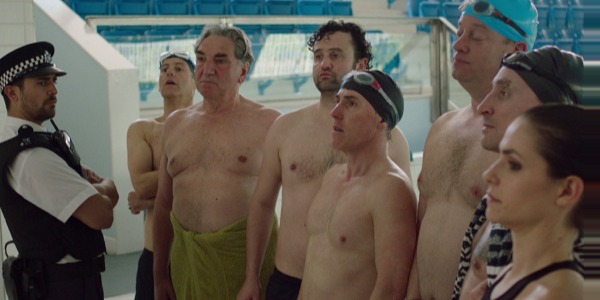SWIMMING WITH MEN: British Comedy Fails To Make A Splash

Alistair is a 25 year old writer based in Cambridge.…
Over in the US, box office receipts for the highest grossing comedies of the year are down, year on year, to the extent that studios are beginning to decrease producing adult-oriented comedies – and on a global scale, the picture is even worse. Not only are audiences around the world tiring of comedy movies, so are the performers starring in them.
At least, that’s what it feels like watching Swimming with Men, a midlife crisis comedy that will surely sink without trace due to how it mishandles the natural, likeable charisma of actor Rob Brydon, casting him against type and struggling to hide how uninterested in the material he is.
Stuck in the shallow end
The latest film from veteran British comedy director Oliver Parker (best known internationally for 2011’s Johnny English Reborn) aims for melancholy in its central character studies; men realising that the sense of adventure in their lives has past them by while they settled into a mind-numbing daily routine. But with no comic weight or engaging performances to truly wrestle with this existential theme, as well as one of the most thoroughly unlikeable characters to be positioned as an “everyman” audience surrogate in recent memory, Swimming with Men isn’t likely to be the big splash that gets cinemagoers back in love with comic filmmaking.
Eric Scott (Brydon) lives an existence that feels like purgatory. He has a high ranking job as an accountant, a comfortable middle class lifestyle, and his wife Heather (Jane Horrocks) has just begun a career in local politics, aiming to help improve the community. And yet he feels increasingly distant – the only time he feels alive is when he’s swimming at the pool every evening after work, something that’s effectively causing a growing distance from his family.

One day, he strikes up a conversation with a struggling synchronised swimming team, and as his home life goes into increased disarray, finds himself asked to join their unit. They’re all drawn to synchronised swimming due to it creating a sense of order in a chaotic world, offering them a release from the suffocating nature of their home lives – but when the opportunity to compete in a tournament on behalf of Great Britain arises, the fun hobby becomes much more serious.
There’s an entire canon of films about disenfranchised men rediscovering their zest for life in unorthodox ways, most notably David Fincher’s adaptation of Fight Club, which is lazily referenced here. But whereas that film (and its source material) was an ahead of its time satire on fragile masculinity becoming toxic, Swimming With Men posits the most toxic anxieties as everyman concerns – we’re introduced to Brydon’s character treating his wife with utter contempt, baselessly accusing her of cheating, which the film asks us to find hilarious to the extent it becomes a tiresome recurring joke.
When his wife does counter these claims, she responds not with a diatribe against his ramblings, but asking if he still loves her; Brydon’s character is presented with an uncritical eye to the extent his self-destructive behaviour doesn’t even tear apart the family, with Parker conveniently forgetting about his problematic home life for significant stretches of the film.
The cast are thrown in at the deep end – and don’t rise to the surface
Brydon doesn’t make for a particularly convincing troubled protagonist. Best known in the UK for his appearances on light entertainment shows and his supporting turn in Gavin and Stacey, the sitcom that propelled James Corden to national fame, he has an inherently likeable screen persona. Even in The Trip, his series with Steve Coogan that he is most internationally known for, his natural charm is subverted somewhat, yet he still comes across as a humanistic counterpart to Coogan.
He feels irritatingly miscast in a comic role of this type, with the character caught between being largely unlikeable as written (even his mandated redemptive arc doesn’t coherently address his earlier issues), and not convincing as played by an actor with built-in goodwill from British audiences.

As for the rest of the titular men, each character is on a different path in life, all chasing some form of closure for earlier demons – a familiar tragicomedy setup pitched at the same level as The Full Monty, only this ensemble’s tight trunks remain firmly on for the majority of the running time. This just doesn’t share a similarly realist zest to its storytelling; for example, it is never explained how exactly this synchronised swimming group formed in the first place, with so many gaps in the establishing logic of their background it feels closer to magical realism than a gritty 21st century retread of the aforementioned male anxiety comedy.
None of the characters are particularly defined; only Jim Carter, as the oldest member of the group, is offered anything meaningful as a widower who maintains the illusion his wife is still with him – a rounded character surrounded by ones who are mere archetypes. From the young felon played by This is England’s Thomas Turgoose, to the former sporting star terrified of not eclipsing past glories played by Daniel Mays, there isn’t a moment where these characters feel genuine, let alone unique. A postscript informs us that the Swedish swimmers we see intermittently throughout the film are the real men’s synchronised swim team whose experiences the film is loosely based on; why that has been translated to the British Isles and scrubbed of any distinctive character is somewhat perplexing.
Conclusion: Swimming With Men
Swimming with Men is a wasted opportunity for what could have been an effective character comedy in the same vein as The Full Monty. The actors within all have natural likability – they’re just ill served by Aschlin Ditta’s screenplay, which either underwrites their characters, or makes them so unlikeable it’s hard to feign interest when even the film struggles to reckon with their behaviour in the first place. Forget diving straight into the deep end, as this is one of the most shallow comedy experiences in quite some time.
What are your thoughts on Swimming With Men?
Swimming with Men is released in the UK on July 6. All international release dates are here.
Does content like this matter to you?
Become a Member and support film journalism. Unlock access to all of Film Inquiry`s great articles. Join a community of like-minded readers who are passionate about cinema - get access to our private members Network, give back to independent filmmakers, and more.
Alistair is a 25 year old writer based in Cambridge. He has been writing about film since the start of 2014, and in addition to Film Inquiry, regularly contributes to Gay Essential and The Digital Fix, with additional bylines in Film Stories, the BFI and Vague Visages. Because of his work for Film Inquiry, he is a recognised member of GALECA, the Gay & Lesbian Entertainment Critics' Association.













